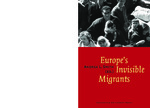Europe's Invisible Migrants
| dc.contributor.editor | Smith, Andrea | |
| dc.date.accessioned | 2010-12-31 23:55:55 | |
| dc.date.accessioned | 2019-12-10 14:46:32 | |
| dc.date.accessioned | 2020-04-01T15:33:44Z | |
| dc.date.available | 2020-04-01T15:33:44Z | |
| dc.date.issued | 2002 | |
| dc.identifier | 340242 | |
| dc.identifier | OCN: 54385833 | en_US |
| dc.identifier.uri | http://library.oapen.org/handle/20.500.12657/35104 | |
| dc.description.abstract | Following the decolonization movements that swept the globe after World War II, between four and six million people were 'returned' to Europe from the colonies. From an exporter of people, Europe turned to a site of immigration for the first time in the twentieth century. Until now, these migrations have been overlooked as scholars have highlighted instead the parallel migrations of former 'colonized' peoples. Europe's Invisible Migrants corrects this bias. This multidisciplinary volume presents essays by prominent sociologists, historians, and anthropologists on their research with these 'invisible' migrant communities. Their work highlights the experiences of colonists returning to France, Portugal and the Netherlands, the intersection of race, citizenship, and colonial ideologies, and the ways these migrations reflect the return of the 'colonial' to Europe. This volume offers fresh insights into immigration, racism and ethnic conflict in post-colonial Europe by presenting colonial repatriates as another 'immigrant' population. | |
| dc.language | English | |
| dc.relation.ispartofseries | Europa | |
| dc.subject.classification | thema EDItEUR::N History and Archaeology::NH History | en_US |
| dc.subject.classification | thema EDItEUR::J Society and Social Sciences::JH Sociology and anthropology | en_US |
| dc.subject.other | geschiedenis | |
| dc.subject.other | sociology | |
| dc.subject.other | sociologie | |
| dc.subject.other | history, geography, and auxiliary disciplines | |
| dc.title | Europe's Invisible Migrants | |
| dc.type | book | |
| oapen.abstract.otherlanguage | Na de Tweede Wereldoorlog kwam er een golf van dekolonisatie over de wereld. Dit had tot gevolg dat tussen de vier en zes miljoen mensen de voormalige kolonien verlieten en terugkeerden naar hun vaderland in Europa. Deze migranten zijn altijd over het hoofd gezien, aangezien onderzoekers de nadruk hebben gelegd op migraties van de voormalig gekoloniseerde bevolking, die gelijktijdig plaatsvonden. Europe's Invisible Migrants vult deze lancune. Het boek is een verzameling van essay's van sociologen, geschiedkundigen en antropologen over deze 'onzichtbare' migranten. De nadruk ligt op ervaringen van ex-kolonisten bij hun terugkeer in Frankrijk, Portugal en Nederland. De nationale en koloniale verschillen in opvattingen over etniciteit en burgerschap waren vaak bepalend voor de mate waarin de migranten werden opgenomen in de Europese samenleving. | |
| oapen.identifier.doi | 10.5117/9789053565711 | |
| oapen.relation.isPublishedBy | dd3d1a33-0ac2-4cfe-a101-355ae1bd857a | |
| oapen.relation.isbn | 9789053565711 | |
| oapen.pages | 248 | |
| oapen.identifier.ocn | 54385833 |

